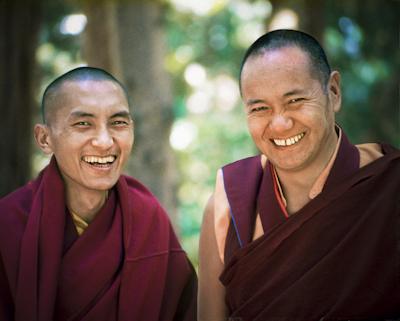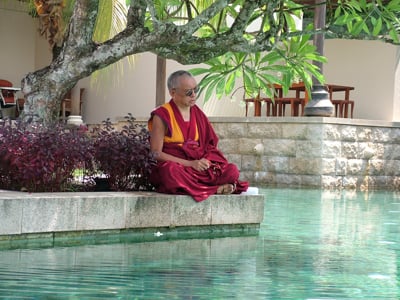Dear LYWA friends and supporters,
Thank you for your kind interest in and support of LYWA. As you know, our fantastic team is dedicated to making the Dharma freely available far and wide and to be able to do that we rely on your generous help. Thank you again.
Visit to Singapore
Well, this month I'm writing to you from balmy Singapore, where it's in the mid-80s. I'm not sure what's happening back home in Boston but I imagine it's a bit colder than that…
I try to make this trip to Singapore and Malaysia annually in order to thank in person if I can the many kind LYWA supporters in this part of the world, whose generous support and kindness in general has meant so much to us over the years. Thank you very much.
Although I planned this trip over nine months ago, I was really happy to learn not too long ago that it would coincide with Lama Zopa Rinpoche's return to Singapore after a two-year absence. Very much looking forward to seeing Rinpoche again on March 9th and 10th at Amitabha Buddhist Centre.
Teachings from Great Lamas
We have just posted two teachings from Geshe Lama Konchog, given at Amitabha Buddhist Centre in 1995. One is A Commentary on the Heart Sutra, and the other is A Commentary on Right Effort, which discusses the application of right effort to our practice and includes teachings on the suffering in this life, generosity, the fasting retreat, the hungry ghost realm and bodhisattvas in cyclic existence. Both were transcribed and edited by Ven. Thubten Konchog. Both are now posted on our companion website, TeachingsFromTibet.com.
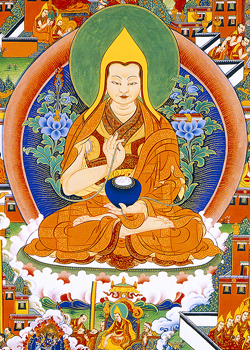 We have also posted two commentaries on the Lama Tsongkhapa Guru Yoga (Ganden Lha Gyäma). The first was given directly to me by His Holiness Tsenshap Serkong Rinpoche in Dharamsala, July 1976, as I was preparing to undertake a short guru yoga retreat. The second was given by Geshe Rabten in Dharamsala in June, 1975. (Both are now posted on our companion website, TeachingsFromTibet.com.)
We have also posted two commentaries on the Lama Tsongkhapa Guru Yoga (Ganden Lha Gyäma). The first was given directly to me by His Holiness Tsenshap Serkong Rinpoche in Dharamsala, July 1976, as I was preparing to undertake a short guru yoga retreat. The second was given by Geshe Rabten in Dharamsala in June, 1975. (Both are now posted on our companion website, TeachingsFromTibet.com.)
And we have added two more interviews to the growing collection we have of talks by His Holiness the Dalai Lama. The first is from an audience with His Holiness at Tushita Meditation Centre, Dharamsala, India, in 1985 where he discusses a range of topics, including how to practice Dharma, the mind or consciousness, rebirth, karma and world peace. The second is from Dharamsala in 1991, and His Holiness discusses reincarnation, karma, meditation and other religions.
All were edited for the web by our incredible Web Editor, Sandra Smith.
Free Books Low in Stock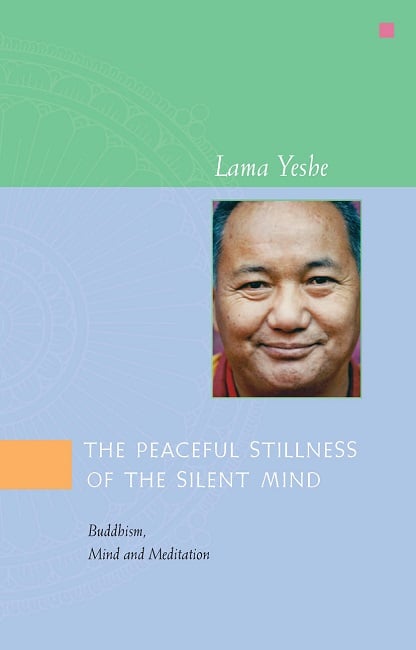 While we rejoice that so many individuals and Centers are interested in our free books, it does mean that we regularly run out of stock of our most popular titles. We are currently almost out of Lama Zopa Rinpoche's Daily Purification: A Short Vajrasattva Practice and Making Life Meaningful, and Lama Yeshe's Life, Death and After Death and Peaceful Stillness of the Silent Mind.
While we rejoice that so many individuals and Centers are interested in our free books, it does mean that we regularly run out of stock of our most popular titles. We are currently almost out of Lama Zopa Rinpoche's Daily Purification: A Short Vajrasattva Practice and Making Life Meaningful, and Lama Yeshe's Life, Death and After Death and Peaceful Stillness of the Silent Mind.
If you would like to sponsor a reprint, please let me know. Or, if you'd like to make a donation toward our Book Printing Fund, please see our Donate Now page, and be sure to choose that you are directing your donation to our Book Printing Fund.
For those of you who are interested in a copy of one of these books and find we are out of stock, remember that all of these books are available to be read for free online, or can be downloaded in pdf or ebook formats, including Kindle, Apple, Nook and more. See our online store for links.
And, if you are from a Center and are looking for multiple copies for a course or other event, we will be happy to arrange a link for your course participants to download an electronic version of the book. Just let us know.
Retreat with Lama Zopa Rinpoche
We just received notice that a 100 Million Mani Retreat with Lama Zopa Rinpoche is to be hosted by FPMT Mongolia from August 1st to 30th 2013. An incredible opportunity to do this most beneficial practice with Rinpoche and fellow Dharma students. More details coming shortly.
For the latest on Rinpoche's travel schedule see the FPMT website, where you can also subscribe to the schedule RSS feed.
We leave you with a teaching on refuge from Lama Yeshe from 1983 that we have just posted on our website. Thank you all so much for your interest in and support of our work to make the Dharma available to all.
Much love, 
Nick Ribush
Director
This Month's Teaching: Why Refuge
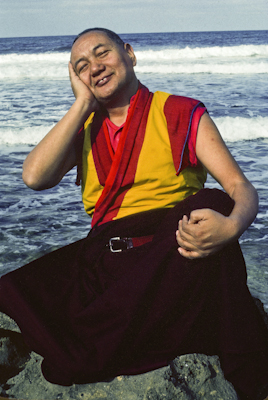 We should not feel that taking refuge is something strange, something new. Already, we take refuge in food, in keeping warm, in houses and clothes and chocolate. Already, we take refuge in these things in order to be happy.
We should not feel that taking refuge is something strange, something new. Already, we take refuge in food, in keeping warm, in houses and clothes and chocolate. Already, we take refuge in these things in order to be happy.
So why should we take refuge now, at this time? What is so special? We should understand clean-clear that taking refuge in chocolate or ice cream is not sufficient, it doesn’t give everlasting realization. The refuge that does give everlasting realization is an inner experience, an inner understanding, and confidence in the Buddhadharma.
Taking refuge in the Dharma is understanding the universal nature of yourself and all beings. This is the way to completely free yourself. This is the way to elevate yourself from all miserable situations. When you understand this there is no reason to be unhappy, to crave ice cream, is there? Anyway, you know—when you buy ice cream and eat it, it is not sufficient, is it?
Think about your own experience, what you take refuge in when you are unhappy. When you’re miserable, you try to do incredible things! You try going to the cinema, going dancing—anything to make you forget your unhappiness. The point is, whatever you take refuge in doesn’t give you a solution: you have to understand this clean-clear.
From now on, from today, understand that ice cream and dancing are superficial, momentary refuges and that practicing Dharma is the everlasting refuge that leads to everlasting happiness. Dharma is the way, Buddha the leader, and Sangha the dear friends who take care, who give good understanding, who energize you by their good behavior.
The other ways we try to take refuge, the samsaric ways, do not fundamentally change the problem; they only supplement. The problem comes up again later in some other way. However, taking refuge in the Buddhadharma lasts, permanently lasts, and is much stronger than refuge in temporary objects.
To take refuge you don’t need to be near a buddha statue or in a temple or prayer place. You can take refuge anywhere; it is simply a state of mind. Wherever you are—in the bathroom, in the car, in bed, in a plane—you can take refuge. It is a simple, very practical thing. You don’t need to do anything, you don’t need a vow. You can take refuge instantly, just like that!
To take refuge means “to rely upon.” We rely upon the Buddha, the Dharma, the Sangha—they are a savior, a liberator. We do not rely upon the buddha image but upon the buddha nature. You put the essence of this inside your heart. That way you become Buddha, you become Dharma, you become Sangha.
Buddha and Dharma seem enough, so why do we need Sangha? We need friends, good friends, don’t we? “Bad” friends influence you and bring you into hell. We know that some humans are chicken-mentality human beings, some are pig-mentality, some monkey, and some snake-mentality. We know this, so we should choose, discriminate. You can go along with your friend but at a certain point you need to say, “Wait a minute, I’m going so far away with you. I’ve got to bring myself this way.” Do you see? Karmically, there is nothing wrong with this. To keep the relationship is important but if your dear friend leads you so far away then you should say, “Dear friend, I love you but I cannot go so far. I don’t have to go like a prisoner with you or do everything you do.” Your own discriminating wisdom tells you what is right, so just cut—cut the connection.
This is so important. This modern world is incredible, I tell you! You can become totally lost. You know this better than I do, I’m sure. It is so important to have a Dharma friend who has correct vision, correct behavior and can protect you from danger. Of course, when we reach the stage of Milarepa we don’t need to depend on Sangha friends because we are completely self-sufficient then.
So today you should make strong determination that temporary refuge is something trivial and does not solve problems. Understand that the only way to finally solve problems is to totally cut the ego, the ignorant desire; to understand the universal reality within you. And the way to do this is to practice Dharma as much as possible from now until death and in each life after that.
But remember, do not take refuge as just another excuse or because of some vague mystical idea. Take refuge with understanding of Buddha’s teaching, with clean-clear honesty and truth, with a wisdom-mind.
Understand the connection between Buddha and you. Buddha has universal love and compassion and complete understanding of reality. You also have compassion and love for people, but it’s limited. You also have wisdom; to some extent you understand yourself but, again, it’s limited. So you want to lift yourself up, have better understanding. You want Buddha’s omnipresent compassion and love and your compassion and love to communicate, to connect, to unify exactly.
Don’t think, “Oh, but I do not have enough qualities.” You do have the qualities of love, compassion and wisdom. Buddhism emphasizes so much that the human being—you—is as important as Buddha: you should have confidence that your present limited wisdom, your weak love and compassion can be limitlessly developed. There is no way to stop its development. The development of material is limited, but this wisdom mind-energy can develop infinitely. Your love can expand without limitation. Your compassion can increase limitlessly. Remember this. It is beautiful, isn’t it? This energy, the human mind, has no limitation at all.
So, have strong motivation and strong confidence. Even though momentarily you feel you cannot have love and compassion for some people, this is only superficial. Today, you have changed your mind: I can give, I can love. Today, make your enemy your object of compassion. You can do it.
A talk given by Lama Yeshe at a refuge ceremony in Madrid, Spain in January 1983. First published in Wisdom magazine in May 1983.
























